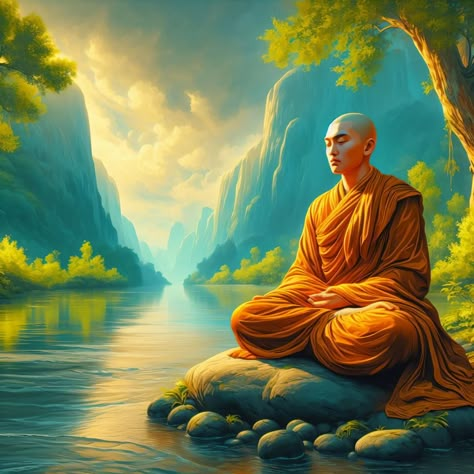Awakening for All: Zazen Fruit: Happiness
“Wise ones think of the tree and obtain the fruit.
Petty ones think of the fruit and don’t obtain the fruit.” Yozan Uesugi
We want happiness. People want money, matter, and might as the sources of happiness. Wanting is endless and wanting is dissatisfaction. Thus, people remain unhappy, wanting more, outside of oneself, spent or lost easily.
Wise ones seek the source of suffering and find that wanting is the source, and the further source of wanting – self with the karma with the triple poisons of desire, divisiveness, and delusion (of self, imbued by long survival strife).
They find the solution in stilling karma (nirvana: no wind, of karma: action, habit, heredity) practically by still sitting by anyone, leading to awakening in the Dharma (universal truth/ethic, applicable to all beyond time and space).
The concrete path is in the triple learnings of morality, samadhi (synthesis), and prognosis. Happiness, originally happening by luck, can now be attained by anyone cultivation (learning: effort), not getting more, but letting go of ego.
April 18, 2025 C.E.
Notes:
1. Yozan Uesugi made the famous poem: Anything done, if one did; not done, if one didn’t. Not done is because one’s not doing.” Caroline Kennedy, former Ambassador to Japan said that her father, JFK, quoted this as the nutshell of his thought of “a man can change a country.” Yozan wrote to his successor that the state and people should not be administered selfishly, as the ruler is for sake of them.
https://en.wikipedia.org/wiki/Uesugi_Harunori
2. Happiness originated from hap (happen, meaning luck). Japanese shiawase (fit into fortune), Indian su-kha (well-going/turning), etc. also originally meant luck/fortune. These later became more the state of good virtue/morality, etc. of human behavior (eudaimonia, tranquillitas, beatitude, etc.). Happiness further became more accessible by human effort (cultivation, change of lifestyle, etc.) individually, socially, and environmentally, finding the universal truth/ethic.
3. “The Dharma (Norm/Law/Truth/Ethic) of all dharmas (forms/phenomena/ truths/ethics)” is Dependent Co-origination, i.e., all phenomena are interdependently co-originated on limitless causes and conditions (similar to the Law of Causality, but deeper and wider – beyond conventions, conceptions, objects, etc.). This means that we are interrelated with other beings (other species, elements, stars, etc.), and relatives to each other, and that we must therefore live together harmoniously and strive to make a wholly wholesome world to become harmonious, healthy, and happy.
4. Karma (grow/create with the past/present physical/verbal/mental action, habit, heredity) is inbued with the triple poisons of desire, divisiveness, and delusion (of ego/mei: I/my). The Buddha said that all living beings are karma-birthed, -heirs, -owners, -machines, and -refuged. He clarified that there is no self-substance with self-sameness (permanent) and self-sovereignty (wishful) entities due to the Dharma (Truth/Law) of all dharmas (phenomena), Dependent Co-origination. We as karma-machines must change to the Dharma-refuged in order to change the world in suffering to that in holiness (wholly wholesome: harmonious, healthy, and happy). “In nothing is limitlessness.”
5. The practice of Zen (jhāna/dhyāna: meditation), the key and core practice of za-zen, sitting meditation, is to still karma, settle in nirvana(nir-vāṇa = ni-vāta: no-wind, of karma), see the Dharma, and serve and save all. This process is categorized in the Four Zen Stages and the Eight Syhthesis (samādhi) Stages (actually Four Zen Stages plus Four Concentration Stages combined). As shown in the Four Zen Stages thoughts, emotions (the representative five coverings: lust-desire, covetousness-malevolence, sloth-drowsiness, agitation-worries, doubts), and volitions (the representative four fluxes: lust, becoming/identification, views/dogmas, nescience/no witness, of nirvana) are stilled in this order. So, these stages are stilling processes of karma into nirvana, where one is freed from the triple poisons (involvement of birth-death, samsara, shift in life modes, and the resultant suffering). The ultimate happiness lies in amṛta, ambrosia of deathlessness by the liberation from want and the wanting ego.
6. The Triple Poisons are desire, divisiveness, and delusion (of a self-same, self-sovereign self). The “Triple Only” are only me, only now, and only money (short-sighted views and actions, which make the wider world worse), which can be cured by the Triple Learnings of morality, synthesis (samādhi), and prognosis.
7. The triple learnings are morality, synthesis, and prognosis (sîla, samādhi, paññâ/prajñâ). This is done by still sitting (zazen: sitting meditation), stilling karma (action with the triple poisons of desire, divisiveness, delusion), settling in samādhi (harmonious synthesis of mind/body/world: nirvana), and providing prognosis to cultivate our volition (to action), emotion, and intellection.
Please refer to 5. What is Karma? in “Why Buddhism Now?”
https://buddhism869196463.wordpress.com/%e3%83%9b%e3%83%bc%e3%83%a0%ef%bc%9ahome/
一切の為の覚醒:坐禅 成果:幸福
「賢者は木を考えて実を得る、小人は実を考えて実を得ない」上杉鷹山
私達は幸福を欲する。人々は幸福の元として金・物・力を欲する。欲は限りなく又欲は不満である。だから人々は不幸のままである、更に欲しく、外に求め、容易に消費し消失するから。
賢者は苦の根源を尋ね、欲が根源と判り、欲の更なる根源が貪瞋痴(長期の生存競争の浸透した我)三毒の業を持つ自己にあると判る。
彼等は業の静止(涅槃、業:行為、習慣、遺伝の)、実際には誰でも出来る静坐で、法(普遍真理/倫理、時空を超えて一切に当てはまる)の覚醒に至る。
具体的な道は戒定(総合)慧の三学にある。幸福は、元来は僥倖であったが、今では修養(学習:努力)で誰にも達成できるものとなった、もっと得るのではなく、我を手放すことだから。
2025共通年4月19日
註:
1.上杉鷹山は「なせば成る なさねば成らぬ 何事も 成らぬは人の なさぬなりけり」という有名な歌を作った。以前の駐日米国大使カロライン・ケネデイーは自分の父、JFけねデーが「一人でも国を変えられる」という考え方を端的に表した言葉として引用していたと言っている。鷹山は自分の後継者に、藩主は藩と人々の為の物だから、藩も人々も自己中心で治めてはならない、と書いている。
https://ja.wikipedia.org/wiki/%E4%B8%8A%E6%9D%89%E6%B2%BB%E6%86%B2
2. Happiness(幸福)はhapˆ(幸運な出来事)に由来する。日本語の「しあわせ(仕合わせ、僥倖に適合する)、インド語のsu-kha (上手く行く/運ぶ) も元は僥倖/幸運を意味した。これらは後にもっと有徳/道徳などの状態を言うようになった(善性、平安、歓喜など)。普遍的真理/倫理の発見により、幸福は更に個人的、社会的、環境的に人間の努力(修養、生活様式変更など)で得られるものとなった。
3. 諸法(形態・現象)の法(規則・法則・真理・倫理)は縁起(因縁生起)、即ち、一切現象は無量の直接原因と間接条件により相依生起するということである(因果則に似ているがさらに深く広い-世俗、観念、対象などを超える)。これは私達が他者(多種、要素、星宿など)と相依関係にあることを意味し、相互に相対的であり、私達が調和、健康、幸福になる為には共に調和して生き、全体健全な世界を作る努力をしなければならないことを意味する。
4. 業(karma, grow/create: 過去現在の身口意行動・習慣・遺伝)は貪瞋(エゴ/メイ:我/我所の)痴の三毒が植え込まれている。ブッダ(覚者)は一切衆生は業—誕生者、—相続者、—所有者、—機械、—依拠者であると言った。彼は、諸法(現象)の法(真理/倫理)である縁起の故に自己同一(永住)と自己主宰(意欲通り)の実態をもった自己物質は存在しないことを明らかにした。業—機械である私達は、苦しむ世界を聖(全体健全:調和、健康、幸福)なる世界に変える為には、法₋依拠者にならなければならない。参考:「無一物中無尽蔵」
5. 鍵となる静坐の実践は業を静め、涅槃(nir-vāṇa = ni-vāta: no-wind, 無風、業風の)に安住し、法を見、一切に奉仕し救済する。坐禅(静坐瞑想)は身体・呼吸・頭脳(身口意)業を整え静止する。四禅は、尋求、伺候、喜悦、安楽を静め平静 (upekhā/upekṣā, 字義は捨離)・涅槃に到達する結果の心的(知性・感情・意欲)業を静止する過程を表示している。だからこの過程は業の静止により涅槃に入るもので、そこでは人は(生死、輪廻、生容態転換と結果の苦に巻き込まれる)三毒から自由になる。究極的な幸福は欲と欲望我からの解放による甘露(不死の神饌)にある。
「今何故仏教か?」の4(涅槃)と5(禅)を参照:
https://buddhism869196463.wordpress.com/%e3%83%9b%e3%83%bc%e3%83%a0%ef%bc%9ahome/
6.三毒は貪瞋痴(自己同一、自己主宰の我という愚痴)である。三だけは今だけ、金だけで自分だけということであり(短見・短絡行動で、より広い世界を悪化させる)が、戒定慧の三学はこれらを治癒できる。
7. 三学は戒定慧(sîla, samâdhi, paññâ/prajñâ)である。これは静坐により、業(貪瞋痴三毒を伴う行為)を静め、三昧(調和総合:涅槃)に安住し、般若(処方:知恵)を与え、知情意を修養する。
.
.
.
.
.
.
.

